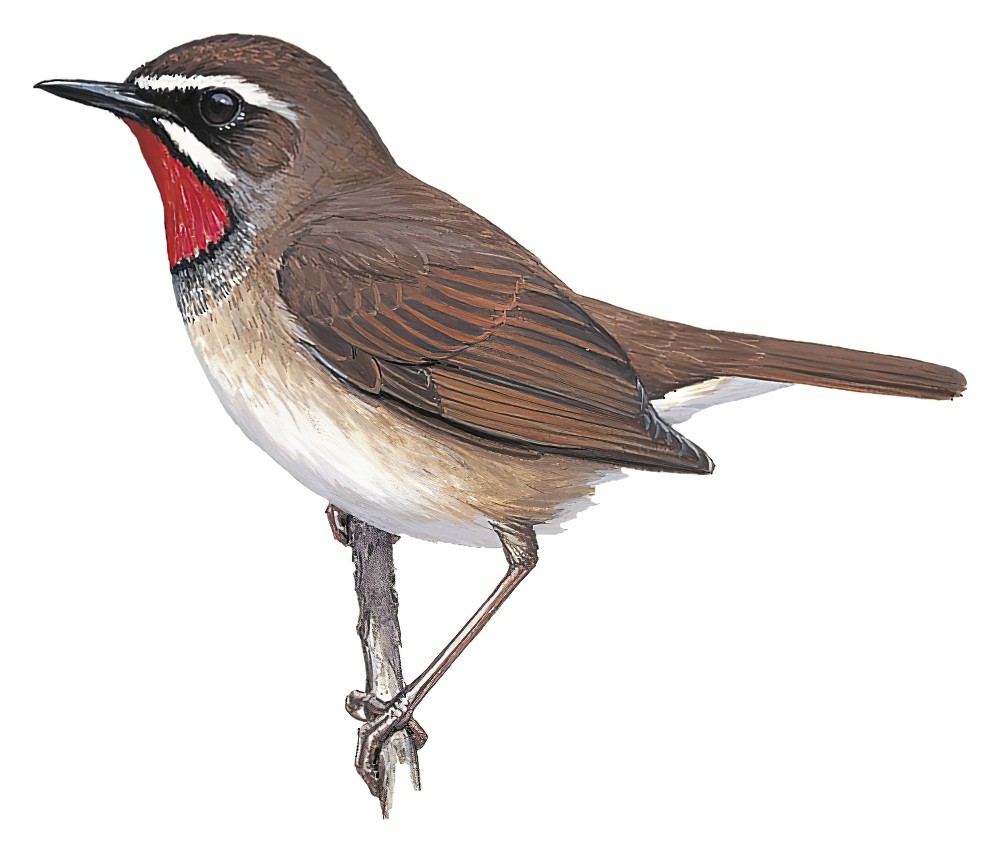Siberian Rubythroat / Calliope calliope

Siberian Rubythroat
SCI Name:
Protonym: Motacilla Calliope ReiseVersch.Provin.Russ.Reichs 3 p.697
Taxonomy: Passeriformes / Muscicapidae / Calliope
Taxonomy Code: sibrub
Type Locality: between the Yenisei and the Lena Rivers.
Author: Pallas
Publish Year: 1776
IUCN Status: Least Concern
DEFINITIONS
CALLIOPE
(Muscicapidae; Ϯ Siberian Rubythroat C. calliope) Specific name Motacilla calliope Pallas, 1776 (< Gr. myth. Calliope, fine-voiced chief of the Muses); "Genus CALLIOPE. GEN. CHAR. Bill shorter than the head, straight, compressed laterally and pointed, with a slight indication of a notch near the tip of the upper mandible: base of the bill garnished with a few fine and short bristles. Nostrils basal and oval. Wings rather short and rounded, the first quill very short, the third and fourth the longest. Tail short and rounded. Tarsi long and slender, the hinder toe furnished with a large strong claw. GORGET WARBLER. Calliope Lathamii. La Calliope. Among the subdivisions into which the Sylviadæ are now distributed, we do not find one to which we can strictly refer the present beautiful bird; we have therefore ventured to form a new genus for its reception, taking the specific appellation of Pallas for its generic designation ... In the silky character of its plumage, in the presence of the gorget, and in the great difference between the sexes, it evinces a close affinity to the Blue-throated Warbler (Phœnicura Suecica), but in its general form and contour it approximates to the Nightingale (Philomela Luscinia), to which we consider it to be most nearly allied. ... Of its nidification and general economy we know but little: it is said to have an agreeable song, which it utters while perched on the topmost branches of trees." (Gould 1837); "Calliope Gould, 1836, Birds Europe, pt. 2, pl. 118, text. Type, by monotypy, Calliope Lathamii Gould = Motacilla calliope Pallas." (Ripley in Peters, 1964, X, p. 33).
Synon. Melodes.
calliope
Gr. myth. Calliope, fine-voiced chief of the Muses, who presided over eloquence and heroic poetry (Calliope, subsp. Pachycephala pectoralis, Selasphorus).
CALLIOPE
(Muscicapidae; Ϯ Siberian Rubythroat C. calliope) Specific name Motacilla calliope Pallas, 1776 (< Gr. myth. Calliope, fine-voiced chief of the Muses); "Genus CALLIOPE. GEN. CHAR. Bill shorter than the head, straight, compressed laterally and pointed, with a slight indication of a notch near the tip of the upper mandible: base of the bill garnished with a few fine and short bristles. Nostrils basal and oval. Wings rather short and rounded, the first quill very short, the third and fourth the longest. Tail short and rounded. Tarsi long and slender, the hinder toe furnished with a large strong claw. GORGET WARBLER. Calliope Lathamii. La Calliope. Among the subdivisions into which the Sylviadæ are now distributed, we do not find one to which we can strictly refer the present beautiful bird; we have therefore ventured to form a new genus for its reception, taking the specific appellation of Pallas for its generic designation ... In the silky character of its plumage, in the presence of the gorget, and in the great difference between the sexes, it evinces a close affinity to the Blue-throated Warbler (Phœnicura Suecica), but in its general form and contour it approximates to the Nightingale (Philomela Luscinia), to which we consider it to be most nearly allied. ... Of its nidification and general economy we know but little: it is said to have an agreeable song, which it utters while perched on the topmost branches of trees." (Gould 1837); "Calliope Gould, 1836, Birds Europe, pt. 2, pl. 118, text. Type, by monotypy, Calliope Lathamii Gould = Motacilla calliope Pallas." (Ripley in Peters, 1964, X, p. 33).
Synon. Melodes.
calliope
Gr. myth. Calliope, fine-voiced chief of the Muses, who presided over eloquence and heroic poetry (Calliope, subsp. Pachycephala pectoralis, Selasphorus).
UPPERCASE: current genus
Uppercase first letter: generic synonym
● and ● See: generic homonyms
lowercase: species and subspecies
●: early names, variants, mispellings
‡: extinct
†: type species
Gr.: ancient Greek
L.: Latin
<: derived from
syn: synonym of
/: separates historical and modern geographic names
ex: based on
TL: type locality
OD: original diagnosis (genus) or original description (species)












